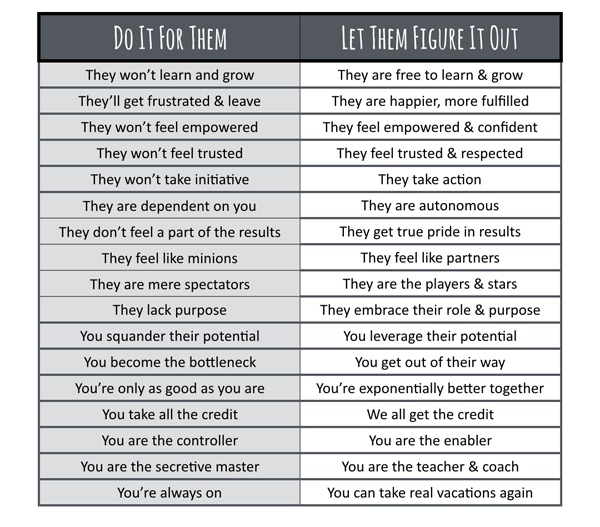One of the best pieces of advice (experience share, OK, OK) I got as a rookie entrepreneur trying to build our team was:
“If you want to see how good your team is and the health of your business, take two weeks off with minimal, if any, contact and see how they do.”
I’ve done it that now several times now over the last couple of years and have been so impressed with our team and their ability to do what we need to do, without me standing over them.
Too often I see entrepreneurs, particularly those with high levels of skills (particularly with tech), struggling with control and delegation. They simply can’t let go of certain things.
And I often struggle with delegation myself.
You know you’re struggling with delegation when you say:
“But it’s just easier, faster, better for me to do it.”
The key question is: “Should I do it for them, or should I let them do it and figure it out on their own?”
Sadly, what happens when we don’t choose to delegate, and them simply do it ourselves, is a whole host of negative things.
Sure, you might get YOUR ideal quality and result when you do it yourself every time … but you also become the bottleneck when you don’t train and delegate to others on your team. And you’re certainly not leveraging your team’s strengths and skills wisely.
Additionally, I know a lot of entrepreneurs who struggle with constant burnout and frustration (that often leads to anger and bitterness — been there, done that) because of this core challenge.
To make the scenario even simpler …. this recently hit home with me as a parent.
We have two young children. As infants, we had to do every thing for them for obvious reasons. But now as they are becoming toddlers, we’re realizing that they can become more autonomous in many ways and we definitely want to encourage them to do so.
I mean, I can’t imagine having a teenager who can’t go to the bathroom by themselves, or fix themselves a drink or a snack, but rather have us scramble to their every whim or need.
In fact, the goal isn’t that we don’t love and care for them … it’s that eventually when they are older and adults and go into the world, we want them to be fully functioning, healthy, happy and autonomous adults. (Even if we follow them around the world because we miss them.)
Back to business though ….
Delegation is probably one of the toughest things I do. It takes continual refinement, practice and communication.
It means letting go and empowering others to do their best.
But I think there are numerous benefits to Letting Others Figure It Out Versus Doing It For Them.
Here is a graphic to illustrate what you typically get with each of those options:

As Dan Pink said in his bestseller “Drive,” it’s all about offering your team, your people, “Autonomy, Mastery and Purpose.”
Here are naunces, caveats, keys to empowering others:
- It doesn’t happen overnight — it takes time, effort and communication.
- We all still make mistakes and that’s OK — that’s called learning. It’s only failure if we don’t learn from them.
- Give more WHY than HOW — it’s tough at first to not give only the how. But if you know the strengths of your team and can clearly
- Trust but verify — it should be known that although you trust your team, you have a responsibility to verify too. Checking up and in is part of that process. It’s also part of the coaching, teaching, training, mentoring part too.
- Editing is improvement, not criticism — One of the toughest aspects for me in delegation is offering feedback at the end or delivery of a project or task. It should be about coaching and teaching, not blame, so that we improve all we do. [See No Blame Necessary] That’s why I like the word “editing” better for this. (ht Jon Acuff).
- Teach values, more than practices — A couple years ago, one of my most trusted and valued team members made a decision. It didn’t turn out well. In fact, it kind of blew up in our face. When we started reviewing what happened together, particularly why she made that action, I smiled … because in her words I knew she had approached it with the values we hold dear first and foremost, and felt empowered and trusted to make the decision, even if it didn’t turn out well initially. If I had instituted a rigid system of practices for her to follow, it would have been worse — and likely we would never had taken action. But instead I sought to help her find any takeaways and reinforced that she took action based on our values (all good), instead of waiting on me or someone else.
- They get the credit; I take the blame — It’s not that we don’t find out what happened and why. But I want my team to get credit for the awesome, values-focused autonomous work they do. And when mistakes happen, as the leader, I take ultimate responsibility. It’s my team. (And by the way, I get way more than my fair share of credit for what we do too.)
- Have the end result in clear view — The best example of delegation was with my COO, Matt Danner. When we named him to that role, we paired him with a leadership coach (aka Smitty). But before they met, Smitty was so good to say, “What do you want the end result to be? What are your goals?” so that he could help train and shape Matt to be that person for me. It turned out rather well.
OK, now I need to get back to work on improving my delegating and empowering.
Leave a Reply